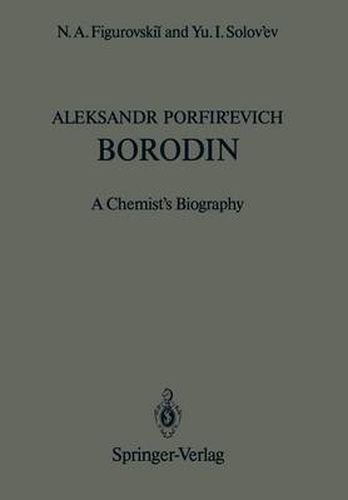Readings Newsletter
Become a Readings Member to make your shopping experience even easier.
Sign in or sign up for free!
You’re not far away from qualifying for FREE standard shipping within Australia
You’ve qualified for FREE standard shipping within Australia
The cart is loading…






This title is printed to order. This book may have been self-published. If so, we cannot guarantee the quality of the content. In the main most books will have gone through the editing process however some may not. We therefore suggest that you be aware of this before ordering this book. If in doubt check either the author or publisher’s details as we are unable to accept any returns unless they are faulty. Please contact us if you have any questions.
A full century has passed since the sudden and tragically premature demise of Aleksandr Porfir'evich Borodin in 1887 at the age of 53, when he was following with phenomenal success the disparate careers of musician, composer, organic chemist, and pioneer in women’s medical education. As a unique figure among the remarkable group of geniuses who suddenly appeared in Russia in the middle of the last century and explosively propelled that country into the mainstream of world culture in the arts, humanities, and sciences, it might have been expected that Borodin was the object of much research. There is no doubt that the Russian contribution to the amazing development of structural chemistry in the last century has tended to be underplayed, while that in the rest of Europe has received much more attention. One wonders, in particular, whether Borodin’s name might not have appeared in the chemical pantheon, as have those of Mendeleev, Markovnikov, Menshutkin, and many other Russians, if the aldol condensation, which he was the first to discover and investigate, had been named the Borodin condensation. Straightening out the record is important; Figurovskii and Solov'ev’s biography does much in this respect. Just as meritorious have been the scholarly and exhaustive efforts of Professors Charlene Steinberg and George B. Kauffman, who have made the Russian text accessible to the Western world in their accurate and engrossing translation.
$9.00 standard shipping within Australia
FREE standard shipping within Australia for orders over $100.00
Express & International shipping calculated at checkout
This title is printed to order. This book may have been self-published. If so, we cannot guarantee the quality of the content. In the main most books will have gone through the editing process however some may not. We therefore suggest that you be aware of this before ordering this book. If in doubt check either the author or publisher’s details as we are unable to accept any returns unless they are faulty. Please contact us if you have any questions.
A full century has passed since the sudden and tragically premature demise of Aleksandr Porfir'evich Borodin in 1887 at the age of 53, when he was following with phenomenal success the disparate careers of musician, composer, organic chemist, and pioneer in women’s medical education. As a unique figure among the remarkable group of geniuses who suddenly appeared in Russia in the middle of the last century and explosively propelled that country into the mainstream of world culture in the arts, humanities, and sciences, it might have been expected that Borodin was the object of much research. There is no doubt that the Russian contribution to the amazing development of structural chemistry in the last century has tended to be underplayed, while that in the rest of Europe has received much more attention. One wonders, in particular, whether Borodin’s name might not have appeared in the chemical pantheon, as have those of Mendeleev, Markovnikov, Menshutkin, and many other Russians, if the aldol condensation, which he was the first to discover and investigate, had been named the Borodin condensation. Straightening out the record is important; Figurovskii and Solov'ev’s biography does much in this respect. Just as meritorious have been the scholarly and exhaustive efforts of Professors Charlene Steinberg and George B. Kauffman, who have made the Russian text accessible to the Western world in their accurate and engrossing translation.